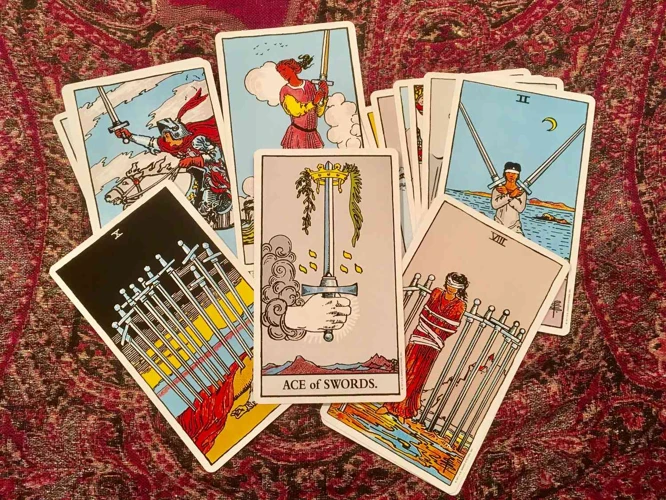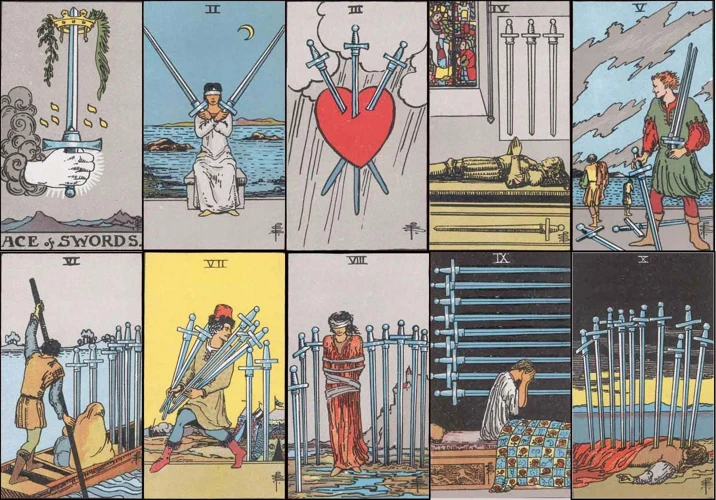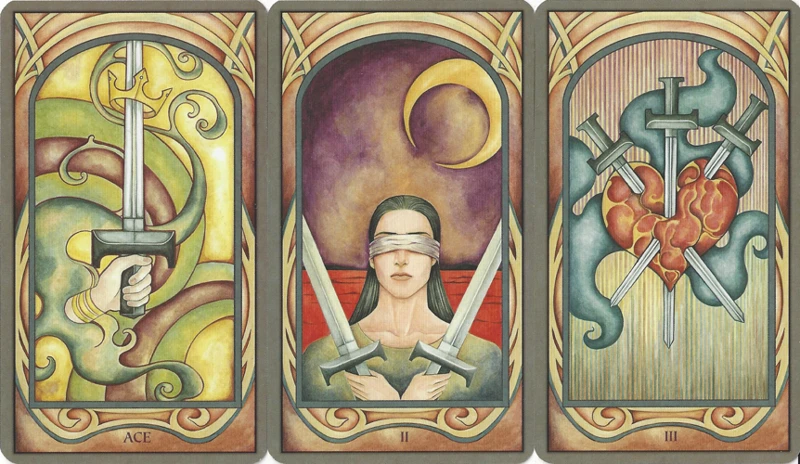What lies beneath the surface of the mysterious Swords suit in the Minor Arcana? Unlocking its meaning and interpretation is like unraveling an enigma, with its rich symbolism and intricate imagery. The Swords suit, represented by the element of Air, holds the key to understanding the realm of thoughts, intellect, and communication. Each card within this suit carries a unique message, revealing the highs and lows of the human experience. Through this comprehensive guide, we will delve into the depths of the Swords suit, exploring its symbolism, elemental correspondences, and its significance in numerology and astrology. Join us on a journey of discovery as we decipher the hidden messages and reveal the profound insights offered by this captivating suit.
Contents
- Overview of the Swords Suit
-
Interpreting the Swords Suit
- 2.1 Ace of Swords: Clarity and New Beginnings
- 2.2 Two of Swords: Dilemmas and Indecision
- 2.3 Three of Swords: Heartbreak and Loss
- 2.4 Four of Swords: Rest and Contemplation
- 2.5 Five of Swords: Conflict and Defeat
- 2.6 Six of Swords: Transition and Moving Forward
- 2.7 Seven of Swords: Deception and Secrecy
- 2.8 Eight of Swords: Restriction and Self-imposed Barriers
- 2.9 Nine of Swords: Anxiety and Worry
- 2.10 Ten of Swords: Endings and Release
- Swords Suit in Relationship Readings
- Examining Reversed Swords Cards
- Conclusion
-
Frequently Asked Questions
- 1. What is the significance of the Swords suit in tarot readings?
- 2. How does the elemental correspondence of Air relate to the Swords suit?
- 3. Are the meanings of Swords cards influenced by numerology and astrology?
- 4. What does the Ace of Swords represent?
- 5. What message does the Five of Swords convey?
- 6. What does the Eight of Swords symbolize?
- 7. How can the Three of Swords card be interpreted in tarot readings?
- 8. What does the Seven of Swords card suggest?
- 9. Can the Swords suit provide guidance in relationship readings?
- 10. Why is it important to consider reversed Swords cards in tarot readings?
- References
Overview of the Swords Suit

The Swords suit is a fascinating and complex aspect of the Minor Arcana in tarot. Represented by the element of Air, it embodies the power of intellect, mental clarity, and communication. The cards in this suit are adorned with symbolic imagery that conveys the essence of their meanings. Swords, typically portrayed as sharp and pointed, represent the sharpness of the mind, intellect, and the power of thought. This suit explores the various aspects of the human experience, including conflicts, challenges, and the pursuit of truth and knowledge.
The Swords suit consists of numbered cards from Ace to Ten, each carrying its distinctive message. These cards depict scenarios and situations that reflect the range of human emotions and experiences. The Ace of Swords signifies clarity, new beginnings, and the potential for personal growth. It represents a clear understanding of one’s journey and the power of transformative ideas.
Moving along, the Two of Swords represents dilemmas and decision-making. It depicts a person blindfolded, holding two swords, signifying the difficulty of choice and the need to make informed decisions. This card suggests a need for thoughtful contemplation and taking a balanced approach.
The Three of Swords delves into the realm of heartbreak and loss. It showcases a heart pierced by three swords, symbolizing emotional pain and sorrow. This card reminds us to acknowledge and process our pain to facilitate healing and eventual growth.
The Four of Swords offers a contrasting energy of rest and contemplation. It depicts a figure resting on a bed with four swords above, indicating a need for solitude, self-reflection, and regaining inner strength.
Next in the suit, the Five of Swords unveils a card of conflict and defeat. It showcases a figure standing triumphantly over others, alluding to manipulation, deceit, and the aftermath of a battle. This card cautions against unethical behavior and reminds us to consider the consequences of our actions.
Moving forward, the Six of Swords represents transition and moving away from troubled waters. Depicting a boat carrying a figure and six swords, this card indicates a journey towards a calmer and harmonious existence. It suggests the need to leave behind negativity and embrace positive change.
On the other hand, the Seven of Swords exposes the realm of deception and secrecy. It shows a figure sneaking away with five swords, symbolizing dishonesty, hidden motives, and the need for caution.
The Eight of Swords represents restriction and self-imposed barriers. It depicts a figure blindfolded, surrounded by eight swords, indicating a sense of feeling trapped or limited. This card encourages us to recognize self-imposed limitations and break free from them.
The Nine of Swords delves into the realm of anxiety and worry. It showcases a figure sitting up in bed, hands on face, surrounded by nine swords. This card represents overwhelming fear and the need to address and overcome our anxieties.
Lastly, the Ten of Swords brings forth the theme of endings and release. It illustrates a figure lying face down with ten swords in their back, symbolizing the finality of a situation or the need to let go and move on.
The Swords suit is a powerful tool for self-reflection, providing insights into our thoughts, conflicts, and challenges. Understanding the symbolism and interpretations of each card enables us to navigate through life’s complexities with wisdom and clarity. So, dive into the realm of the Swords suit and unravel the enigmatic messages it has to offer.
[Internal Link: To learn more about the symbolism and interpretations of the Cups suit in the Minor Arcana, visit symbolism-cups-suit-minor-arcana.]
1.1 The Symbolism and Imagery of Swords
The Swords suit in tarot is rich in symbolism and imagery, offering profound insights into the realm of intellect and communication. The primary symbol of this suit is, of course, the sword itself. Symbolically, the sword represents the power of the mind, logic, and analytical thinking. It embodies cutting through the illusions of ignorance and falsehoods to reveal the truth. The sharpness of the sword signifies mental clarity and the ability to discern with precision.
The imagery associated with swords varies across different tarot decks, but certain motifs are commonly seen. Many cards depict swords pointed upward, symbolizing the connection between the individual and the greater realm of truth and knowledge. The upward position also represents the triumph of the mind over adversity and challenges.
In some cards, the sword may be shown piercing through clouds or darkness, indicating the power of intellectual insights to penetrate through confusion or doubt. This imagery emphasizes the importance of using reason and logic to navigate life’s complexities.
Another frequently observed symbol is the presence of double-edged swords. These swords represent the dual nature of thoughts and communication – they can be both constructive and destructive. They remind us to be mindful of our words and thoughts, as they can have far-reaching consequences.
The number of swords depicted in the cards is also significant. A single sword often represents focused thought and decisive action, while multiple swords may suggest conflict, challenge, or a need for balance.
It is important to note that the symbolism and imagery of swords can vary between different tarot decks. Some may incorporate additional elements, such as elemental symbols or astrological references, to deepen the meanings associated with the cards. Exploring different deck variations can provide further insights into the symbolism of swords.
Understanding the symbolism and imagery of the Swords suit allows us to interpret the messages contained within each card accurately. By recognizing the meaning behind the symbols, we gain a deeper understanding of the power of the mind, the realm of thoughts, and the significance of communication.
[Internal Link: To explore the significance of the Wands suit in tarot, visit wands-suit-significance.]
1.2 The Elemental Correspondence of Swords
The Swords suit in the Minor Arcana is deeply tied to the element of Air. Air represents intellect, thought, communication, and the power of the mind. It is associated with logic, analysis, and the ability to make rational decisions. The Elemental Correspondence of Swords highlights the connection between this suit and the element of Air, providing insight into the energies and qualities it embodies.
In tarot readings, the Swords suit reflects the realm of thoughts and ideas, emphasizing the importance of mental clarity and effective communication. It encourages us to tap into our intellect and harness the power of our thoughts to navigate through challenges and conflicts. The elemental association with Air further deepens the understanding of the Swords suit.
Air is known for its intangible nature, just like thoughts and ideas. It cannot be seen or touched directly but has a profound impact on our lives. Similarly, the Swords suit delves into the invisible realm of the mind, diving into our thoughts, beliefs, and perceptions. It asks us to examine the intellectual aspect of ourselves and understand the influence of our thoughts on our reality.
To further illustrate the elemental correspondence, let’s explore the qualities of Air that are reflected in the Swords suit:
1. Clarity: Air is often associated with clarity of thought and mental acuity. Similarly, the Swords suit invites us to seek clarity and to see situations objectively, free from emotional biases. The ability to think with clarity and precision is crucial when interpreting and understanding the messages of the Swords cards.
2. Communication: Air facilitates the flow of communication, making it an elemental correspondence for Swords. The suit reminds us of the power of effective communication and the necessity of clear and honest expression. It highlights the importance of articulating our thoughts and ideas while listening attentively to others.
3. Rationality: Air represents logic and rational thinking. It calls for a logical approach to problem-solving and decision-making. The Swords suit encourages us to analyze situations and make choices based on reason and rationality rather than being swayed solely by emotions.
4. Adaptability: Air is dynamic and ever-changing, symbolizing adaptability and flexibility. Similarly, the Swords suit emphasizes the need to adapt to different situations and be open to new perspectives and ideas. It reminds us to be agile in our thinking and willing to embrace change.
[Internal Link: To understand the role of Court Cards in the Minor Arcana, visit court-cards-role-minor-arcana.]
The elemental correspondence of Swords to the element of Air enhances our understanding of the suit’s nuances and offers valuable insights into the nature of the challenges, conflicts, and thought processes depicted in the cards. By recognizing and harnessing the qualities associated with Air, we can navigate the complexities of life with clarity, effective communication, and rationality.
1.3 Swords in Numerology and Astrology
In numerology and astrology, the Swords suit in the Minor Arcana carries its unique significance and symbolism. Each numbered card within the suit corresponds to a specific number, adding depth and layers of meaning to their interpretations.
Starting with the Ace of Swords, which is associated with the number one, it represents new beginnings, clarity, and the power of focused thought. The number one signifies individuality, creativity, and originality, reflecting the transformative potential of this card.
Moving on to the Two of Swords, it corresponds to the number two in numerology. The number two symbolizes duality, balance, and partnership. This card is often associated with decision-making, reflecting the need to find equilibrium and make thoughtful choices.
The Three of Swords aligns with the number three, which represents communication, expression, and creativity. This card signifies heartbreak and loss, emphasizing the importance of acknowledging and expressing emotions for healing and growth.
Next, the Four of Swords corresponds to the number four, known for stability, structure, and practicality. This card’s energy revolves around rest, contemplation, and regaining inner strength. The number four reinforces the need for solid foundations and a balanced approach.
Moving along to the Five of Swords, it aligns with the number five, which symbolizes change, freedom, and adaptability. This card reflects conflict and defeat, reminding us to be mindful of our actions and consider the consequences. The number five suggests embracing change as a means of growth and personal transformation.
The Six of Swords corresponds to the number six, representing harmony, cooperation, and balance. This card signifies transition and moving forward from challenging situations. The number six emphasizes finding peace and the importance of leaving behind negativity for a brighter future.
On to the Seven of Swords, which aligns with the number seven known for introspection, analysis, and spirituality. This card carries the energy of deception and secrecy, urging us to trust our instincts and navigate situations with caution. The number seven encourages seeking inner wisdom and understanding.
Moving forward, the Eight of Swords corresponds to the number eight symbolizing discipline, responsibility, and authority. This card represents restriction and self-imposed barriers, reminding us to recognize our limitations and take steps to break free from them. The number eight emphasizes personal power and taking accountability for our lives.
The Nine of Swords aligns with the number nine, known for introspection, compassion, and universal love. This card embodies anxiety and worry, drawing attention to our fears and the need for self-care and emotional healing. The number nine signifies emotional transformation and letting go of negative thoughts.
Lastly, the Ten of Swords corresponds to the number ten, representing endings, completion, and transformation. This card signifies release and the need to let go of what no longer serves us. The number ten holds the energy of finality and marks the completion of a cycle, opening the door for new beginnings.
In astrology, the Swords suit is associated with the element of Air, representing the intellect, logic, and communication. Air signs, including Gemini, Libra, and Aquarius, embody the qualities of the Swords suit, emphasizing the importance of thoughtfulness, clarity, and effective communication.
Understanding the numerological and astrological aspects of the Swords suit provides additional layers of interpretation and insight into the cards’ meanings. Incorporating these aspects enriches the tarot reading experience, allowing for a deeper understanding of the messages conveyed by the Swords suit’s cards.
Interpreting the Swords Suit

Interpreting the Swords suit requires a deep understanding of the symbolism and meanings associated with each card. Each card within the suit carries its distinct message, shedding light on different aspects of the human experience. Let’s explore the interpretations of some key cards within the Swords suit:
1. Ace of Swords: This card represents clarity, new beginnings, and the power of the mind. It signifies a breakthrough or a moment of profound understanding. It encourages us to embrace new perspectives and use our mental agility to overcome challenges.
2. Two of Swords: The Two of Swords symbolizes dilemmas and indecision. It depicts a figure blindfolded, holding two crossed swords. This card suggests the need to weigh our options carefully and make balanced decisions. It reminds us that sometimes a period of thoughtful contemplation is necessary before taking action.
3. Three of Swords: The Three of Swords delves into the realm of heartbreak and loss. It portrays a heart pierced by three swords, emphasizing emotional pain and sorrow. This card reminds us to acknowledge our feelings of grief and navigate through the healing process with compassion and self-care.
4. Four of Swords: The Four of Swords offers a moment of respite and contemplation. It portrays a figure at rest, surrounded by four swords. This card signifies the importance of taking a break, replenishing our energy, and engaging in deep self-reflection. It encourages us to find inner peace and clarity.
5. Five of Swords: The Five of Swords represents conflict and defeat. It showcases a figure standing triumphantly over others, swords in hand. This card serves as a cautionary reminder that victory achieved through unethical means is hollow. It encourages us to seek resolution through open communication and cooperation.
6. Six of Swords: The Six of Swords symbolizes transition and moving forward. It portrays a figure and a boat, crossing calm waters with six swords. This card signifies leaving behind a challenging situation and embarking on a journey toward a better future. It encourages us to embrace change and trust in the process of personal growth.
7. Seven of Swords: The Seven of Swords reveals the presence of deception and secrecy. It portrays a figure sneaking away with five swords. This card serves as a warning to be cautious of cunning, manipulation, and hidden agendas. It advises us to trust our instincts and maintain integrity in all our endeavors.
8. Eight of Swords: The Eight of Swords signifies restriction and self-imposed barriers. It depicts a figure blindfolded and surrounded by eight swords. This card represents a sense of feeling trapped or limited by our own thoughts or beliefs. It reminds us to recognize the power we have to break free from self-imposed limitations and embrace our true potential.
9. Nine of Swords: The Nine of Swords delves into the realm of anxiety and worry. It portrays a figure in bed, hands on face, surrounded by nine swords. This card represents overwhelming fear and distress. It reminds us to address our anxieties, seek support, and find healthy ways to alleviate our worries.
10. Ten of Swords: The Ten of Swords brings forth the notion of endings and release. It illustrates a figure lying face down with ten swords in their back, symbolizing the finality of a difficult situation. This card offers a reminder that sometimes we must let go and surrender to the completion of a cycle in order to experience growth and transformation.
The interpretations of the Swords suit cards mentioned above provide a glimpse into the breadth and depth of insights offered by this captivating suit. Each card serves as a mirror to our thoughts, challenges, and triumphs, enabling us to gain clarity and make informed decisions on our life’s journey.
2.1 Ace of Swords: Clarity and New Beginnings
The Ace of Swords holds a significant presence within the Swords suit, symbolizing clarity and new beginnings. Ephemeral yet powerful, this card emerges as a beacon of truth and intellectual breakthroughs. At the heart of its imagery lies a single sword, upright and adorned with a crown. This depiction signifies the raw power and potential of the mind, capable of cutting through confusion, falsehoods, and illusions to uncover profound insights.
As the embodiment of clarity, the Ace of Swords invites us to embrace a new perspective and a deeper understanding of ourselves and the world around us. It signifies a surge of mental energy, where ideas and concepts converge to form a clear vision of our path ahead. It represents a breakthrough moment, where the fog of uncertainty dissipates, allowing us to see through the veil and gain a sense of direction.
In essence, the Ace of Swords serves as an invitation to embrace the power of our own thoughts and intellect. It encourages us to trust our instincts and pursue new ideas or ventures with confidence and determination. This card symbolizes the potential for intellectual growth, enhanced communication, and the ability to express ourselves with clarity and conviction.
When the Ace of Swords appears in a tarot reading, it signifies the emergence of new insights or opportunities on the horizon. It could represent a surge of mental clarity, helping us find solutions to complex problems or make important decisions. This card also serves as a reminder to remain open-minded and receptive to new ideas and perspectives.
In relationships, the Ace of Swords can indicate a period of honest and open communication. It encourages clear and direct conversations that foster understanding and resolution. It may also suggest the need for setting boundaries and speaking our truth with kindness and empathy.
The presence of the Ace of Swords is a powerful sign of potential and new beginnings. It urges us to harness the power of the mind, embrace clarity, and embark on a journey of intellectual growth and self-discovery.
[Internal Link: To explore the significance of the Wands suit in the Minor Arcana, visit wands-suit-significance.]
2.2 Two of Swords: Dilemmas and Indecision
The Two of Swords, a card within the Swords suit of the Minor Arcana, encapsulates the essence of dilemmas and indecision. When this card appears in a tarot reading, it serves as a reminder of the complexities that come with making choices. The imagery on the card depicts a figure sitting with a blindfold, holding two crossed swords. This symbolism reflects the need to carefully consider options and weigh the consequences before proceeding.
The Two of Swords signifies a period of deliberation and a state of mind where decisions may feel overwhelming or challenging. The blindfold worn by the figure represents a lack of clarity, suggesting that there may be information or perspectives that are hidden or yet to be uncovered. It serves as a warning against rushing into decisions without fully understanding the situation at hand.
This card prompts us to seek balance and equilibrium when faced with dilemmas. It urges us to carefully assess our options, weighing the pros and cons of each. The crossed swords indicate the necessity of finding a middle ground or compromise between conflicting ideas or viewpoints. It encourages us to look beyond superficial appearances and delve deeper into the heart of the matter.
In a reading, the Two of Swords may indicate a need to take a step back and detach emotionally from the situation. It advises us to adopt an objective perspective, allowing for greater clarity and understanding. This card invites us to trust our intuition and inner wisdom, taking the time to connect with our own values and beliefs.
When feeling torn between choices, the Two of Swords advises us to pause, reflect, and gather more information if necessary. It may be helpful to seek advice from trusted individuals who can provide different perspectives. By embracing patience and giving ourselves the space to explore possibilities, we can move closer to finding a resolution.
In relationships, the Two of Swords suggests a need for open and honest communication. It reminds us to listen actively to both our own needs and the needs of others involved. This card serves as a gentle reminder that indecision can create stagnation, and in order to move forward, choices must be made.
Ultimately, the Two of Swords encourages us to trust ourselves and the process of decision-making. It invites us to acknowledge that making choices is a natural part of life, and while the path may not always be clear, we have the ability to find our way. By embracing the energy of the Two of Swords, we can navigate through dilemmas with grace, weighing our options mindfully and finding a harmonious resolution.
[Internal Link: To explore the significance of the Court Cards in the Minor Arcana, visit court-cards-role-minor-arcana.]
2.3 Three of Swords: Heartbreak and Loss
The Three of Swords is a card that delves into the depths of heartbreak and loss. Its symbolism portrays a heart pierced by three swords, which serves as a visual representation of emotional pain and sorrow. When this card appears in a tarot reading, it often signifies a time of profound sadness and grief.
At its core, the Three of Swords encourages individuals to confront and acknowledge their pain rather than repressing or denying it. It serves as a reminder that healing can only begin once the emotions surrounding heartbreak and loss are recognized and processed.
In terms of relationships, the Three of Swords often indicates the end of a significant connection or a betrayal that has caused immense hurt. It may represent a breakup, separation, divorce, or the revelation of infidelity. The card suggests that there is a need to face the truth and accept the pain to move forward towards healing and eventual closure.
In personal matters, the Three of Swords signifies a period of emotional turmoil and sadness. It can reflect the experience of disappointment, betrayal, or the loss of a loved one. It is crucial during this time to seek support from friends, family, or a professional counselor who can provide guidance and comfort.
When interpreting this card, it is essential to remember that pain and loss are a natural component of the human experience. The Three of Swords serves as a reminder that these challenges are opportunities for growth and transformation. It encourages individuals to engage in self-reflection and take the necessary steps to heal and rebuild their lives.
The Three of Swords represents heartbreak and loss in its most profound sense. Through its symbolism, it reminds us of the importance of acknowledging and processing our pain. By doing so, we can begin the journey towards healing, closure, and personal growth.
Key Points:
– The Three of Swords represents heartbreak and loss in the tarot.
– Its symbolism depicts a heart pierced by three swords, symbolizing emotional pain and sorrow.
– This card urges individuals to confront and acknowledge their pain rather than repressing it.
– In relationships, it often signifies the end of a connection or a betrayal that has caused immense hurt.
– Seeking support from loved ones or professionals is crucial during this time.
– The Three of Swords reminds us that pain and loss are opportunities for growth and transformation.
2.4 Four of Swords: Rest and Contemplation
The Four of Swords is a card that brings forth the energy of rest and contemplation. It depicts a figure lying on a bed or a slab with their hands crossed over their chest, resembling a burial posture. This card symbolizes the need for solitude, stillness, and introspection. It encourages the individual to take a break from the chaos of life and retreat into a peaceful state of mind.
Key Meanings:
– Rest and recuperation: The Four of Swords signifies the importance of taking a pause and allowing oneself to rest and recharge. It suggests a period of recuperation and rejuvenation for emotional and mental well-being.
– Contemplation and introspection: This card invites us to reflect on our life, past actions, and current circumstances. It encourages deep introspection and contemplation, helping us gain clarity and insight into our thoughts and emotions.
– Seeking inner peace: The Four of Swords points towards the search for inner peace and tranquility. It suggests finding solace in solitude and nurturing a sense of calm within ourselves.
– Planning and strategizing: During times of stillness, the Four of Swords prompts us to plan and strategize for the future. It advises taking a step back from the daily grind and considering our goals, priorities, and the actions required to achieve them.
Interpretation:
When the Four of Swords appears in a reading, it signifies a need for rest and self-care. It reminds us that pushing forward relentlessly without taking breaks can lead to burnout and exhaustion. It encourages us to create space in our lives for relaxation and rejuvenation. This card may indicate that it’s a suitable time for a vacation or retreat where we can detach from our usual responsibilities and focus on recharging ourselves.
The Four of Swords also indicates the significance of introspection and self-reflection. It suggests that taking the time to analyze our thoughts, beliefs, and actions will provide valuable insights and clarity. Engaging in meditation, journaling, or therapy can be highly beneficial during this period. It advises us to silence the external noise and listen to the wisdom within ourselves.
In terms of planning and strategizing, the Four of Swords reveals that this is a favorable moment to map out our goals and devise a plan for achieving them. It reminds us that in stillness, we can access our inner wisdom and create a solid foundation for future actions. This card encourages us to assess our priorities and make deliberate choices that align with our long-term vision.
The Four of Swords emphasizes the importance of taking a break, embracing solitude, and engaging in self-reflection. By doing so, we can find the inner peace and clarity needed to navigate challenges and make informed decisions on our path towards personal growth and success.
2.5 Five of Swords: Conflict and Defeat
The Five of Swords is a card in the Swords suit of the Minor Arcana that signifies conflict and defeat. Its imagery captures the essence of a battle and its aftermath. In this card, a figure stands triumphantly over others, holding three swords, while the defeated figures walk away with a sense of resignation. This card symbolizes moments of victory achieved through manipulation, deceit, or an unfair advantage.
When the Five of Swords appears in a tarot reading, it suggests that conflicts have arisen in your life or are on the horizon. There may be tension, disagreements, or power struggles within your relationships or professional environment. It is important to be cautious as this card highlights the potential for manipulation or unethical behavior. It reminds us to consider the consequences of our actions and to be aware of the impact they may have on others.
In some cases, the Five of Swords may also represent a personal defeat or a sense of being overpowered. It is a sign that you may have lost a battle or faced setbacks. This card advises reflecting on the situation and learning from the experience to avoid similar outcomes in the future. It encourages resilience and the ability to bounce back from defeat.
In relationships, the Five of Swords may indicate conflicts, breakups, or instances where power dynamics are at play. It is a reminder to communicate openly, honestly, and respectfully to avoid further damage. Conflict resolution and compromise may be necessary to restore balance and harmony.
In business or career-related readings, the Five of Swords can suggest office politics, competition, or power struggles. It advises you to be strategic and diplomatic in your approach, avoiding engaging in dubious tactics or stepping on others to get ahead. Channeling your energy towards constructive collaboration and building positive relationships can lead to a more successful outcome.
The Five of Swords serves as a warning to navigate conflicts and defeat with integrity and ensure that your actions align with your values. It prompts you to evaluate the consequences of your choices and seek resolutions that benefit all parties involved. By addressing conflicts responsibly and learning from defeat, you can grow stronger and wiser in your journey.
[Internal Link: To explore the significance of the Wands suit in the Minor Arcana, visit wands-suit-significance.]
2.6 Six of Swords: Transition and Moving Forward
The Six of Swords is a card in the Swords suit that embodies the theme of transition and moving forward. Depicting a boat carrying a figure and six swords, this card symbolizes a journey towards a calmer and more peaceful existence. The boat represents the vessel that carries us from turbulent waters to a place of tranquility and stability. It signifies a period of transition and the willingness to leave behind the challenges and difficulties of the past.
The figure in the boat represents the seeker, who is ready to embark on a new chapter in their life. They are leaving behind a stormy and troubled situation, choosing to navigate towards a more positive and harmonious future. The act of moving forward is reflected in the positioning of the swords in the boat. They are securely fastened, indicating a sense of stability and protection during this transition.
The Six of Swords is a card of hope and optimism. It suggests that by embracing change and taking steps towards a new direction, we can find solace and healing. It encourages us to let go of the past and trust the journey ahead. While the journey may not always be easy, this card reassures us that we have the inner strength and resilience to navigate through any challenges we may encounter.
In terms of relationships, the Six of Swords indicates a period of transition or growth within the partnership. It may signify leaving behind old patterns or conflicts and moving towards a healthier and more fulfilling dynamic. This card reminds us to communicate openly, work together, and support each other as we navigate through this transitional phase.
In career and finances, the Six of Swords suggests a shift or change in our professional or financial circumstances. It may be a sign to leave behind a stagnant or unfulfilling job and pursue new opportunities that align with our passions and goals. This card encourages us to have faith in our abilities and trust that this transition will lead us to a more rewarding and prosperous path.
The Six of Swords also emphasizes the importance of self-care and self-reflection during times of transition. It urges us to take time for introspection, to heal from past wounds, and to nourish our emotional well-being. This card reminds us that self-care is essential as we navigate through changes, allowing us to embrace new beginnings with a sense of clarity and renewed energy.
The Six of Swords is a powerful card that signifies a period of transition and moving forward. It invites us to release the burdens of the past, embrace change, and trust in the journey ahead. By recognizing the opportunities for growth and healing, we can navigate through life’s challenges with grace and ease.
[Internal Link: To explore the significance of the Wands suit in tarot, visit wands-suit-significance.]
2.7 Seven of Swords: Deception and Secrecy
The Seven of Swords in the Swords suit of the Minor Arcana is a card that embodies the themes of deception and secrecy. It portrays a figure sneaking away with five swords, evoking a sense of cunning and trickery. This card serves as a reminder that not everything is as it seems, and there may be hidden agendas or dishonesty at play.
When the Seven of Swords appears in a tarot reading, it often suggests the need for caution and vigilance. It indicates a situation where someone may be acting with deceit or trying to manipulate others for their own gain. This card urges us to stay alert and trust our instincts to avoid falling victim to deception.
In relationships, the Seven of Swords can indicate dishonesty or secrets within a partnership. It may represent someone who is not being completely forthright or who might be hiding something important. This card advises us to have open and honest communication with our partners, encouraging transparency and trust.
Professionally, the Seven of Swords warns against underhanded tactics or office politics. It signifies that there may be covert actions or hidden agendas taking place in the workplace. It is essential to be cautious of colleagues who may not have your best interests at heart and to protect yourself from potential harm or betrayal.
On a personal level, the Seven of Swords may suggest that we need to be mindful of our own actions and motivations. It encourages us to reflect on whether we are being honest with ourselves and others. Have we been withholding information or manipulating situations to our advantage? This card prompts us to take responsibility for our actions and seek a more authentic and truthful approach to life.
In reverse, the Seven of Swords may indicate a release from deception or the exposure of hidden truths. It signifies a chance to break free from dishonesty and regain clarity and trust. However, it is important not to become overly suspicious or paranoid in the process. Instead, use the lessons learned from the Seven of Swords to foster empathy, understanding, and open communication.
When encountering the Seven of Swords, it is crucial to remember that honesty and integrity are the bedrock of any healthy relationship or endeavor. By acknowledging deception and secrecy, we can strive for a more transparent and genuine existence, ensuring that truth prevails over deception.
[Internal Link: To gain more insights into the role of court cards in the Minor Arcana, explore our article on court-cards-role-minor-arcana.]
2.8 Eight of Swords: Restriction and Self-imposed Barriers
The Eight of Swords in the Swords suit is a card that symbolizes restriction and self-imposed barriers. Depicted in the card is a figure blindfolded with hands bound, surrounded by eight swords. This imagery illustrates a sense of feeling trapped or limited in a situation. The blindfold signifies the inability to see clearly, while the bound hands represent a lack of control or ability to take action.
The Eight of Swords serves as a reminder that often, the restrictions we face are not external but rather self-imposed. It suggests that we may be limiting ourselves through our own fears, insecurities, or negative beliefs. These self-imposed barriers can prevent us from reaching our full potential and hinder our progress.
This card prompts us to examine the underlying thoughts and beliefs that hold us back. It encourages us to question our assumptions and consider whether they are valid or simply products of our own self-doubt. By confronting and challenging these limiting beliefs, we can begin to dismantle the barriers we have created for ourselves.
In a reading, the Eight of Swords may indicate a situation where we feel stuck or unable to make decisions due to a lack of confidence or fear of failure. It suggests the need to break free from these self-imposed limitations and take control of our own lives.
To overcome the restriction symbolized by the Eight of Swords, we must first recognize that we have the power to change our circumstances. By acknowledging our fears and doubts, we can start to challenge them and find ways to move forward. This may involve seeking support or guidance from others, exploring new perspectives, or taking small steps towards our goals.
Ultimately, the Eight of Swords serves as a call to take ownership of our actions and choices. It reminds us that we have the ability to remove the blindfold, untie the bounds, and free ourselves from the self-imposed barriers that hold us back. By doing so, we can unlock our true potential and embrace the possibilities that lie beyond our perceived limitations.
So, when the Eight of Swords appears in a tarot reading, it serves as a powerful invitation to examine the self-imposed restrictions in our lives and take steps towards breaking free. It encourages us to embrace our own power and reclaim our freedom, enabling us to move forward with confidence and overcome any obstacles that stand in our way.
2.9 Nine of Swords: Anxiety and Worry
The Nine of Swords is a card in the Swords suit of the Minor Arcana, representing anxiety and worry. When this card appears in a tarot reading, it signifies a state of distress and overwhelming fear. The imagery depicted on the card enhances the meaning and interpretation of this challenging card.
1. Visual Representation
The Nine of Swords often displays a figure sitting up in bed with their hands on their face, surrounded by nine swords. The person’s body language conveys a sense of anguish and despair. The swords hovering above symbolize the thoughts and worries that torment the mind, further exacerbating the feeling of anxiety.
2. Interpretation
The Nine of Swords highlights the impact of extreme stress and worry on an individual’s mental and emotional well-being. It indicates a state of relentless overthinking and irrational fears that may be keeping the person awake at night. This card suggests that the individual may be going through a period of intense self-doubt, guilt, or regret. It is important to understand that the worries portrayed may not necessarily reflect the reality of the situation but rather reflect the individual’s perception of it.
3. Key Symbolism
– Swords: The swords represent the power of thoughts, ideas, and mental processes. In the context of the Nine of Swords, they indicate thoughts that have spiraled out of control, causing distress and anxiety.
– Dark Night: The card is often depicted with a dark and somber setting, symbolizing the depths of despair and the feeling of being trapped in a cycle of negative thoughts.
4. Emotional Turmoil
The Nine of Swords signifies the overwhelming weight of anxiety and worry that can consume a person’s emotional state. It suggests that the individual may be experiencing sleepless nights, nightmares, or racing thoughts that hinder their ability to find peace.
5. Encouragement and Support
While the Nine of Swords can be a challenging card to receive, it serves as a reminder that seeking support and guidance is crucial during times of anxiety. This card encourages the person to reach out to trusted individuals for emotional support, professional assistance, or counseling. It reminds the individual that they are not alone and that there are resources available to help alleviate their worries.
The Nine of Swords in the Swords suit of the Minor Arcana represents anxiety and worry. It symbolizes the distress and torment caused by excessive thoughts and fears. While this card may indicate a difficult period in one’s life, it also offers a reminder to seek support and guidance. By acknowledging and addressing the underlying causes of anxiety, it is possible to find a path towards healing and inner peace, transcending the worries that plague the mind.
[Internal Link: To explore the role of Court Cards in the Minor Arcana, check out our article on court-cards-role-minor-arcana.]
2.10 Ten of Swords: Endings and Release
The Ten of Swords is a card in the Swords suit that represents an ultimate ending or release from a difficult situation. This card often evokes a sense of finality and completion.
In the imagery of the Ten of Swords, there is a figure lying face down on the ground with ten swords piercing their back. This portrayal signifies the culmination of a challenging journey or ordeal. The figure’s posture suggests a surrender or acceptance of the situation. The ten swords symbolize the weight of the burdens that have accumulated, reaching a breaking point.
The Ten of Swords teaches us that there are times when we need to acknowledge when something is truly over and stop resisting the inevitable. It urges us to let go of any attachments or illusions that may be holding us back. While the ending may be painful or uncomfortable, it also brings the opportunity for growth, healing, and a fresh start.
When this card appears in a reading, it can indicate that we have reached the end of a difficult phase or situation in our lives. It may signify the completion of a project, the end of a relationship, or the resolution of a long-standing conflict. Although it may be challenging, the Ten of Swords reminds us that this ending also paves the way for new beginnings.
In terms of interpretation, the Ten of Swords calls for acceptance and surrender. It signifies the need to release any resistance or attachment to the past and embrace the opportunities that lie ahead. It advises us to avoid dwelling on the pain or disappointment of the ending and instead focus on the lessons learned and the possibilities for growth and renewal.
When reversed, the Ten of Swords may indicate that we are resisting change or struggling to let go. It suggests that we may be clinging to old patterns, beliefs, or relationships that no longer serve us. In such cases, the card encourages us to examine our resistance and consider the potential benefits of releasing what is no longer serving our highest good.
The Ten of Swords represents the transformative power of endings and release. It reminds us that even in the midst of discomfort or sorrow, there is the potential for new beginnings and growth. By embracing the lessons learned and having faith in the future, we can navigate this transition period with grace and resilience.
Swords Suit in Relationship Readings

When it comes to relationship readings, the Swords suit in tarot offers profound insights into the dynamics and challenges within romantic, platonic, or familial connections. Each card within the Swords suit carries its unique message, shedding light on various aspects of relationships. Let’s explore how the Swords suit can provide guidance and understanding in relationship readings:
1. Ace of Swords: In relationship readings, the Ace of Swords signifies the potential for clarity and open communication. It suggests a fresh start and the need for honest and direct conversations to foster a strong foundation.
2. Two of Swords: The Two of Swords represents dilemmas and indecision in relationships. It highlights the need for compromise and finding balance in conflicting situations. This card encourages open and honest communication.
3. Three of Swords: In relationship readings, the Three of Swords reveals heartbreak and emotional pain. It signifies the need for healing and addressing underlying issues. This card prompts individuals to allow themselves to grieve and seek solace.
4. Four of Swords: The Four of Swords indicates the importance of rest and contemplation in relationships. It encourages individuals to take time for self-care and reflection, allowing for personal growth and understanding within the relationship.
5. Five of Swords: When the Five of Swords appears in relationship readings, it suggests conflicts and power struggles. It calls for individuals to engage in productive communication and find a middle ground to resolve disputes.
6. Six of Swords: The Six of Swords symbolizes transitioning from challenging times to a peaceful and calmer phase in relationships. It represents leaving behind negativity and embarking on a journey of growth and understanding together.
7. Seven of Swords: In relationship readings, the Seven of Swords warns of potential deception and secrecy within relationships. It advises individuals to trust their instincts and to address any underlying issues with transparency.
8. Eight of Swords: The Eight of Swords signifies self-imposed barriers and restrictions in relationships. It urges individuals to break free from limiting beliefs and to establish open and honest communication for true connection.
9. Nine of Swords: When the Nine of Swords appears in relationship readings, it suggests anxiety and worry. It indicates the need for individuals to address their fears and concerns together, offering support and reassurance.
10. Ten of Swords: The Ten of Swords represents endings and release in relationships. It may indicate the need to let go of a toxic or unhealthy connection for the sake of personal well-being and growth.
By interpreting the Swords suit cards in relationship readings, individuals can gain valuable insights into the challenges, dynamics, and potential outcomes within their relationships. These cards encourage open communication, self-reflection, and the willingness to address underlying issues to foster healthy and fulfilling connections.
Examining Reversed Swords Cards
Examining reversed Swords cards adds an additional layer of depth and nuance to the tarot reading. When a Swords card appears in reverse, it alters the interpretation and introduces a unique energy to the reading. Reversed Swords cards often indicate internal conflicts, blocked communication, or distorted thinking.
The Ace of Swords in reverse suggests a lack of clarity or confusion surrounding new beginnings. It advises caution when embracing new ideas or embarking on a new path. The Two of Swords reversed signifies unresolved dilemmas and an unwillingness to make decisions. It highlights the need to confront these issues head-on and work towards resolution.
When the Three of Swords appears reversed, it indicates a gradual healing process after heartbreak and loss. It suggests that emotional wounds are gradually being mended, and there is hope for moving forward. The Four of Swords in reverse represents restlessness and an inability to find peace through contemplation. It suggests the need to actively seek out ways to find inner calmness and restore balance.
Reversed Swords cards also reflect the negative aspects of their upright counterparts. The Five of Swords in reverse signifies a potential shift towards resolution and reconciliation after conflicts and defeat. It encourages forgiveness and finding common ground. The Six of Swords reversed suggests resisting necessary change or refusing to let go of the past. It indicates a reluctance to move forward and navigate through challenging transitions.
The Seven of Swords in reverse highlights a possible exposure of deception and secrets. It signifies that hidden motives may be revealed, and caution should be exercised in trusting others. The Eight of Swords reversed represents a breakthrough in breaking free from self-imposed restrictions. It signifies a willingness to confront fears and expand one’s boundaries.
When the Nine of Swords appears reversed, it indicates a gradual release of anxiety and worry. It suggests that with patience and self-care, these burdens can be alleviated. The Ten of Swords in reverse signifies the end of a difficult cycle or a release from prolonged suffering. It represents the opportunity for healing and renewal.
Examining reversed Swords cards requires careful consideration of the flipside energies and interpretations. It reminds us to be aware of our internal struggles, the need for clear communication, and the importance of addressing any distorted thought patterns. By incorporating these reversed cards into readings, we gain a more holistic understanding of the challenges and opportunities presented to us.
Conclusion
In conclusion, the Swords suit in the Minor Arcana is a captivating and thought-provoking aspect of tarot. Its symbolism, elemental correspondences, and numerological and astrological significance all contribute to its profound interpretation and meaning. The Swords suit represents the realm of thoughts, intellect, communication, and conflicts within the human experience. Each card within this suit carries a unique message, guiding us through the highs and lows of life.
From the Ace of Swords, which invites clarity and new beginnings, to the Ten of Swords, which signifies endings and release, the Swords suit offers a comprehensive exploration of the human psyche. It presents dilemmas, heartbreak, rest, conflict, transition, deception, restriction, anxiety, and more. Through studying and interpreting the messages of the Swords cards, we gain valuable insights into our own thought processes, emotions, and the challenges we face.
Whether used in personal reflection, divination, or relationship readings, the Swords suit provides a deep understanding of the conscious and intellectual aspects of our lives. It encourages us to analyze our thoughts, make informed decisions, and seek truth and clarity. It also serves as a reminder to be mindful of the power of our words and actions, as well as the consequences they may bring.
As we journey through life, the Swords suit acts as a compass, guiding us on a path of self-discovery and personal development. It allows us to explore the depths of our own minds, confront our fears and anxieties, and find the strength to overcome obstacles. By harnessing the wisdom of the Swords suit, we can navigate the complexities of life with greater awareness, understanding, and resilience.
In summary, the Swords suit is a fascinating and enigmatic aspect of the tarot, offering profound insights into the realm of thoughts and intellect. Its symbolic imagery, elemental correspondences, and numerological and astrological significance all contribute to its rich and layered interpretation. By unlocking the mysteries of the Swords suit, we unlock a deeper understanding of ourselves and the challenges we face, allowing us to embark on a journey of growth, clarity, and self-discovery.
Frequently Asked Questions
1. What is the significance of the Swords suit in tarot readings?
The Swords suit in tarot readings represents the realm of thoughts, intellect, and communication. It dives deep into the complexities of the human experience, uncovering conflicts, challenges, and the pursuit of truth and knowledge.
2. How does the elemental correspondence of Air relate to the Swords suit?
The element of Air is associated with intellect, rationality, and communication. It aligns perfectly with the Swords suit as it symbolizes the power of thoughts, mental clarity, and the ability to communicate effectively.
3. Are the meanings of Swords cards influenced by numerology and astrology?
Absolutely! Numerology and astrology play significant roles in shaping the meanings of Swords cards. The numbers and astrological associations add layers of depth and symbolism, enriching the interpretation of each card.
4. What does the Ace of Swords represent?
The Ace of Swords signifies clarity, new beginnings, and the potential for personal growth. It offers a fresh perspective, transformative ideas, and the promise of intellectual insight.
5. What message does the Five of Swords convey?
The Five of Swords portrays conflict and defeat. It warns against unethical behavior, manipulation, and the negative consequences of engaging in battles that leave no winners behind.
6. What does the Eight of Swords symbolize?
The Eight of Swords represents restriction and self-imposed barriers. It reminds us to examine our fears, limitations, and negative self-talk, encouraging us to break free from them and pursue personal liberation.
7. How can the Three of Swords card be interpreted in tarot readings?
The Three of Swords signifies heartbreak and loss. It urges individuals to acknowledge and process their emotional pain, promoting healing and the potential for emotional growth.
8. What does the Seven of Swords card suggest?
The Seven of Swords suggests deception and secrecy. It prompts us to be cautious of hidden motives, untrustworthy individuals, and the need to maintain our guard.
9. Can the Swords suit provide guidance in relationship readings?
Yes, the Swords suit can offer valuable insights in relationship readings. It sheds light on communication issues, conflicts, and challenges within partnerships, helping individuals navigate their relationships with wisdom and understanding.
10. Why is it important to consider reversed Swords cards in tarot readings?
Reversed Swords cards offer a different perspective and indicate potential blockages or obstacles in the areas of thoughts and communication. They encourage individuals to address these challenges and find resolutions to restore balance and harmony.






